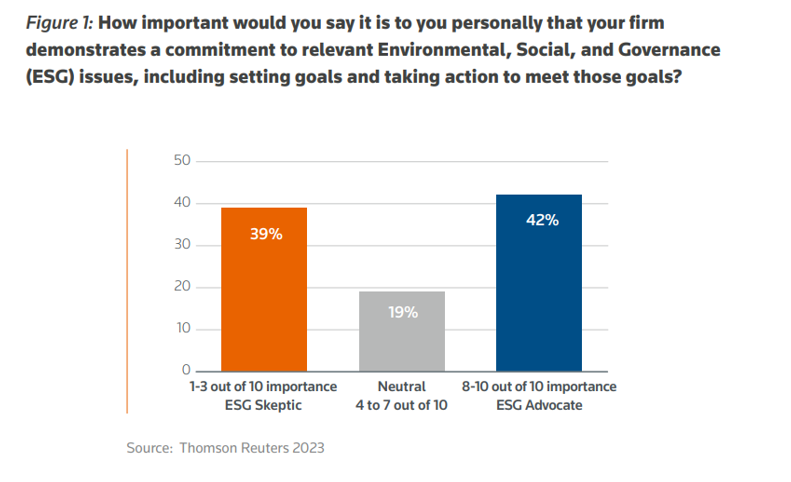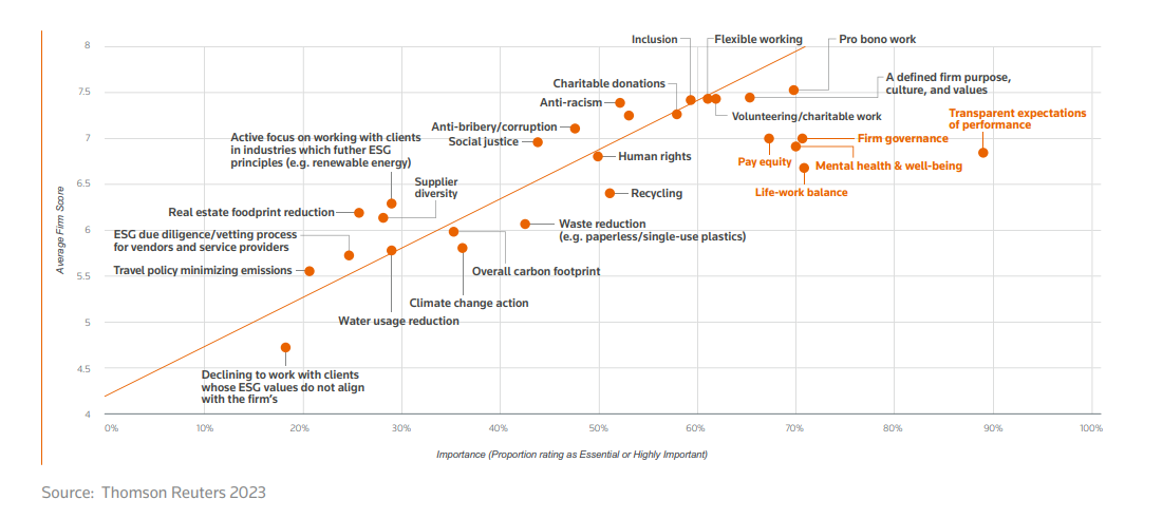In a new paper from the Thomson Reuters Institute, we see how fears of the polarizing effects of ESG initiatives within law firms may be greatly overblown
Polarization around environmental, social & governance (ESG) issues has ramped up in 2023 largely due to ongoing conservative-led culture wars undertaken as a way to score points in the political discourse currently happening in the United States.
Within the business environment, however, ESG is more grounded in reality as a lens through which expanded risks and opportunities are analyzed. ESG has more staying power than current political talking points because the implementation of regulations in the European Union start in earnest in 2024 for companies based in that region and with significant operations outside of the E.U. In addition, the U.S. Securities and Exchange Commission (SEC) has proposed greenhouse gas reporting rules in response to growing pressure from shareholders and other institutional investors, such as insurance companies and pension funds, with long investing horizons.
Indeed, the geopolitical risks that have grown significantly over the last few years — in part because of climate change and calamitous weather events — have caused billions of dollars in losses for many corporations and governments. Further, the increases in risks and regulatory action are being felt by corporate law departments as well. In fact, ESG issues are among the top risks on the horizon cited by in-house law department leaders when it comes to keeping abreast of regulatory changes, ongoing risks around data privacy and cybersecurity, and the increasing importance of ESG and diversity, equity & inclusion (DEI) in general.
Given all of the attention that ESG is receiving, and the likely ongoing regulatory evolutions related to it taking place over the next several years, the Thomson Reuters Institute recently conducted a survey among law firm employees at all levels. The survey — detailed in the new paper, ESG polarization in law firms: More myth than reality — focused specifically on ESG in relation to the firms themselves and the perspectives of employees, including:
Polarized narrative around ESG is more principle than practice — The term ESG is definitely polarizing. About 80% of our survey respondents said they considered it to be either highly important or unimportant that their firms demonstrate a commitment to ESG, with roughly equal numbers at each of those extremes.
However, when asked about how important certain individual issues under the ESG umbrella were, the polarization lessened. Perceptions of individual issues — such as recycling, pay equity, pro bono work, and mental health & well-being — trended toward more important rather than less.

Fundamental disagreement exists on taking external action on some issues — Respondents disagreed on whether a firm should look to work more closely with those clients and suppliers whose values on ESG are more aligned with the firm’s stand on ESG issues, and whether firms should contribute to the wider debate on ESG issues or remain silent.
This will be an ongoing tension with a varied range of opinions on the scope of issues that law firm leaders will have to manage around ESG.
Issues of high importance drive employee recruitment and retention — Issues which benefitted lawyers directly seemed to be a driver of positive perceptions of employee experience and branding in recruitment. Across the board, more than two-thirds of respondents at least agreed somewhat that their firm’s current performance in ESG issues of high importance “makes me proud to work here” and that they “would proactively praise my firm’s performance in these areas, when talking to someone considering joining the firm.”
Prioritizing of key areas by law firms is critical — Despite the myth-busting around the polarization of ESG, insights from our research suggest that actions by law firms are necessary around five key ESG issues of high importance, especially because of the implications for employee retention and recruitment. These ESG issues include transparent expectations of performance, pay equity, firm governance, work-life balance, and mental health & well-being.

Despite all the attention that ESG is getting, the fact remains that law firms need to respond to employees’ views on ESG issues in order to better foster a culture of transparency, accountability, and inclusion that will allow more law firms to attract and retain talent in an increasingly socially conscious business landscape.
You can download a copy of the new paper, “ESG polarization in law firms: More myth than reality”, by filling out the form below:







